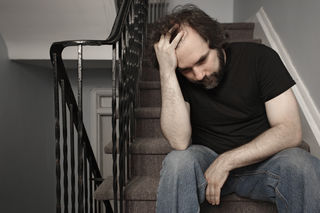Addiction
The Self-Medicating Drug Addict
What to do when drug addiction masks deeper and more unsettling issues.
Posted June 10, 2019 Reviewed by Davia Sills

Imagine this: You go to the doctor with a serious cough, and he performs an exam on you which reveals that you have walking pneumonia. Would the doctor treat the cough, or would they treat the pneumonia? Smart money says that they would treat the pneumonia, because the pneumonia is the problem.
The cough was only a symptom.
The same holds true for some cases of drug addiction. In my 30 years of experience as a drug addiction specialist (I own and operate my own rehab facility and have treated thousands of addicts and alcoholics in my career), I’ve encountered, time and again, hapless souls whose journey into addiction began with the client being completely aware that something was terribly wrong with them, yet not knowing how to deal with it or—even worse—not having the resources to deal with it. For them, drugs and/or alcohol are little more than a coping mechanism that oftentimes quickly blossoms into newer and harsher problems that become the cure that almost kills them.
We use the term “self-medicating” when substances, drugs, or alcohol are abused in order to deal with the symptoms of a mental health issue. In order to understand how this happens, we need to break down the reasons why these people turned to them in the first place by identifying the psychological maladies they never knew they were afflicted with. As you are already probably aware, mental illness can go undiagnosed and untreated for long periods of time. I, myself, knew that I was genetically predisposed to mental illness (my mother was obsessive and a total love addict with my father; she desperately needed his attention and was jealous—he was more important to her than her own children), but I’d never consciously accepted the idea that the chemical imbalance in my own brain would one day make it my worst enemy, nor that I would ever succumb to what I like to call “the boiling frog effect.”
The boiling frog is a syllogism that centers around a frog being boiled alive. The premise is that since it is cold-blooded, if a frog is put suddenly into a pot of boiling water, it will jump out, but if a frog is placed into a pot of tepid water that is then slowly brought to a boil, the frog will remain oblivious of the danger and will, in turn, be cooked to death. We know for a fact that this is not true at all; thermoregulation by changing location is built into every animal’s survival strategies.
But metaphorically speaking, it was not built into mine.
I developed a panic disorder. There came a time in my life where my anxiety ruled my world. I would spend countless nights lying awake in bed—all night—taking the smallest problems and catastrophizing them until all I could do was obsessively worry about them. The world was a dark place, and I saw no light at the end of the tunnel. And it wasn’t as if I’d woken up one day, and my entire worldview had shifted; this happened over time, like a cloud-front slowly moving in that eventually blotted out the sun.
Or the proverbial frog which had no idea that someone had turned up the heat.
I was having breakfast with my family one morning when it dawned on me that I was probably obsessing so much that I couldn’t be with my own family and enjoy the moment, and with this realization came another: I probably needed help. I went to see a psychiatrist, and after a grueling two or three-hour session, we decided that perhaps an antidepressant was in order.
And I’ve got to tell you, a week or two on that medication, and it was as if the skies parted for me, and I was finally able to get to the root of the issues I’d been tormented by and actually have a life.
Which begs the question, “How about the millions and millions of people who don’t know to seek help? What do they do?” The answer? They find ways to cope with whatever they’re experiencing: they self-medicate.
There are a plethora of undiagnosed mental health issues that everyday people are forced to walk hand-in-hand with, and not everyone has the wherewithal to seek professional help. Sometimes, all a person needs is to accidentally take something and feel okay—if only for a moment—for that person to start down the road of addiction. Don’t believe me? Here’s a laundry list of what I see on a day-to-day basis in my treatment center:
- Attention-Deficit Hyperactivity Disorder? Cocaine and methamphetamine increase focus, attention, and energy levels and, in some instances, actually calm a person down in much the same way that prescription drugs like Ritalin, Adderall, and Vyvanse do (and these, too, are often abused as well).
- Sleep disorder? There are approximately 50-70 million adults in the U.S. who suffer from sleep disorders. And there are alcoholics who learn early on that if you drink enough at night, you can sleep like a baby. If they are particularly crafty, they may discover that prescription drugs like Valium, Xanax, Ambien, Lunesta, or Klonopin also do the trick. These drugs are also easy for an addict to abuse.
- Do you have anxiety? Our culture is quickly becoming one that throws alcohol and marijuana at many levels of anxiety, even those that are easily managed by diet or therapy or medications that don’t affect your mind or cognition.
- Chronic pain? It would surprise you how many people abuse opioids like Oxycontin, Vicodin, or the deadly Fentanyl for a pain that could just as easily be managed by aspirin.
I know veterans who have known combat who turn to alcohol as their only relief from the torment of post-traumatic stress disorder (PTSD). For that matter, we can lump in young adults who have been neglected or abused before their brains were fully developed, who also seek relief from childhood trauma in the bottle or the drug, and who sometimes never get help until it is too late.
And these are just the instances that we know of. The homeless population alone is teeming with citizens who are at a high risk for self-medication due to an untreated medical or mental illness.
The list can go on and on, but my point remains the same: I am not proposing that everyone who is addicted to drugs and alcohol is also suffering from some other co-occurring disorder; I am proposing that maybe we can help some people not fall into the bottomless pit of addiction by helping them investigate the possibility that maybe there are other, healthier alternatives for them (that won’t upset or destroy their lives). Education and awareness are key if we’re going to stem the tide of addiction and help people to help themselves. But you’ve also got to take into consideration my own story before you step out into that brave new world and extend the hand to someone who needs it. Ask yourself one important, final question:
Are you, yourself, the boiling frog?




